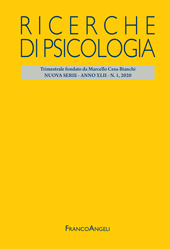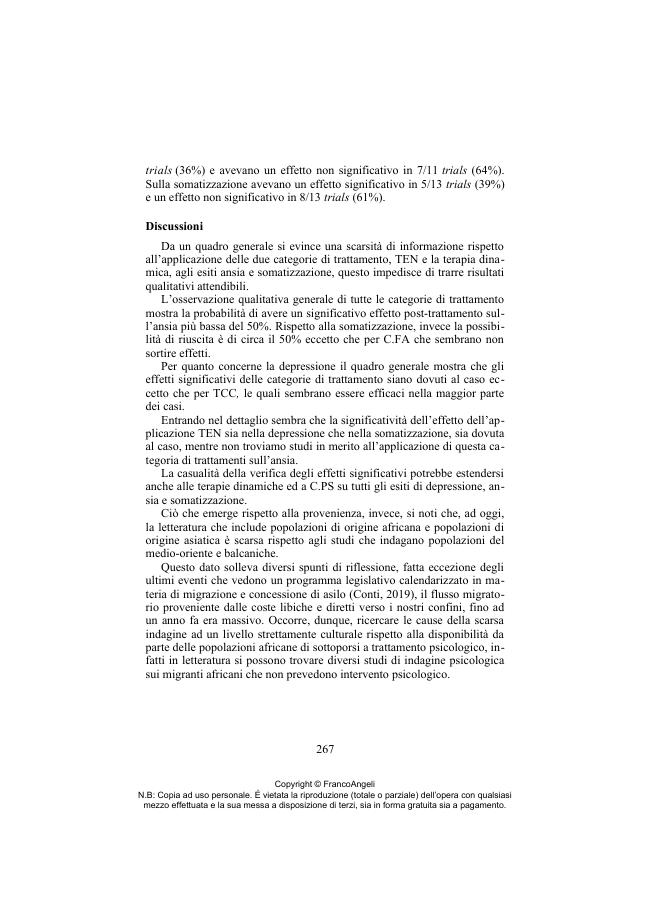L'efficacia degli interventi psicologici sulla depressione, ansia e somatizzazione nei migranti
259-274 p.
La migrazione forzata di massa e un fenomeno che negli ultimi anni ha sollevato questioni socio-economiche rispetto ai problemi di contenimento dei flussi e di integrazione socio-lavorativa dell'emigrato nel paese di destinazione. Le cause della migrazione forzata si ritrovano nei conflitti, nella povertà, nelle violenze persecutorie e torture che avvengono nei paesi di origine, nel crescente divario fra ricchi e poveri e nel debito pubblico che azzera gran parte della ricchezza economica di alcune nazioni. Tutto questo impatta in modo inequivocabile sulla salute dei migranti lasciando sequele indelebili.
Negli ultimi anni, infatti, il panorama scientifico ha ampliato il focus di interesse, includendo l'aspetto psicologico del migrante. Le esperienze traumatiche subite dai migranti si hanno luogo in tre momenti: prima, durante e dopo il viaggio migratorio. Tutto questo causa ripercussioni psicologiche che sono tipiche ed inconfondibili, tra la sintomatologia piu rilevante emerge la depressione, l'ansia e la somatizzazione. Negli ultimi anni nasce, dunque, l'esigenza di promuovere il benessere psicologico del migrante nel paese ospitante. L'obiettivo della review era valutare l'efficacia dei trattamenti psicologici maggiormente applicati sui migranti effettuando un'analisi qualitativa della letteratura. La raccolta iniziale dei dati era focalizzata su studi che includevano interventi psicologici e/o farmacologici con una valutazione pre-trattamento e post-trattamento della depressione, dell'ansia e della somatizzazione.
La selezione includeva studi di tipo controllato-randomizzato, studi quasi sperimentali e studi osservazionali. La review e stata condotta su 52 studi. I trattamenti psicologici sono stati categorizzati in 5 categorie di trattamento (terapia cognitivo comportamentale, terapia di esposizione narrativa, terapia dinamica, trattamenti psicologici combinati, trattamenti psicologici combinati con trattamenti farmacologici). Per ogni categoria sono stati calcolati i risultati significativi e non significativi in riferimento agli esiti: depressione, ansia e somatizzazione. I risultati qualitativi della review mostravano che le terapie cognitivo comportamentali avevano effetto significativo sulla depressione nel 61% dei casi, sull'ansia nel 50% dei casi, sulla somatizzazione in nessun caso.
Le terapie di esposizione narrativa avevano effetti significativi sulla depressione nel 57% dei casi, sulla somatizzazione nel 50% dei casi e sull'ansia in nessun caso. Le terapie dinamiche avevano un effetto significativo sulla depressione nel 50% dei casi, sull'ansia nel 50% cosi come sulla somatizzazione. I trattamenti psicologici combinati avevano un effetto significativo sulla depressione nel 46% dei casi, cosi come sull'ansia e sulla somatizzazione nel 60% dei casi. I trattamenti psicologici combinati con i trattamenti farmacologici avevano un effetto significativo sulla depressione nel 61% dei casi, sull'ansia nel 36% dei casi e sulla somatizzazione nel 39% dei casi. L'osservazione qualitativa, in generale, mostrava una probabilità di avere un significativo effetto post trattamento sull'ansia più bassa del 50% rispetto alla somatizzazione.
Entrando nel dettaglio dei trattamenti sembrava che gli effetti delle terapie cognitivo comportamentali erano dovuti al caso rispetto all'ansia, mentre pareva avessero effetti significativi sia sulla somatizzazione che sulla depressione. Per quanto riguarda le terapie di esposizione narrativa sembrava che la probabilità di avere un effetto significativo sulla depressione era dovuta al caso cosi come per la terapia dinamica e per i trattamenti psicologici combinati, questi tuttavia non sembravano sortire effetti sulla depressione e sull'ansia. Per quanto riguarda i trattamenti psicologici combinati con trattamenti farmacologici si riscontrarono effetti significativi di efficacia sulla depressione ma non su ansia e somatizzazione. [Testo dell'editore].
The massive forced migration is a phenomenon that has raised socio-economic questions in the last years respect to the problems of the flowes containment and social and employment integration of the emigrants in the countries destination. The causes of the forced migration are originated from the poverty, war conflicts, tortures, persecutions different types of violence happening at the country of provenience, growing up between rich and poor and in the public debts which wipes the economic wealth of some nations. This aspects impact on migrants health leave indelible sequelae. In the last years, indeed, the scientific landscape has extended the focus of interest on psychological aspect of the migrant. The traumatic experiences suffered by the migrants can be observed in 3 moments: before, during and after the migration traveling. These experiences cause typical and distinctive psychological sequelae, same as depression, anxiety and somatization as the much more relevant symptomology.
Therefore, the necessity to promote the psychological wellness of the migrants in the host country arises in the recent years. The aim of the review was to assessed the efficacy of the main psychological treatments applied to the migrants through a thoroughly and qualitative analyses of the literature. The preliminary collection of data was focused on studies that provided psychological interventions with a pre-treatment and post-treatment assessment at least of the depression, anxiety and somatization. The selection included studies of the three kinds: randomized-controlled design, almost experimental, observative. The review was conducted including 52 studies. The psychological interventions have been classified in 5 categories of treatment (cognitive-behavioural therapy, narrative exposure therapy, dynamic therapy, combined psychological treatments, psychological treatments combined with pharmacological treatments). There were calculated the significative and non-significative results for each category.
of treatment referring to each outcome: depression, anxiety and somatization. The qualitative results of the review showed that the cognitive-behavioural therapy had a significative effect on the depression at 61% of the cases, on anxiety at 50% of the cases, and had no effects on the somatization. The narrative exposure therapy had significative effects on the depression at 57% of the cases), it had effects on somatization at 50% of the cases and had no effects on anxiety. The dynamic therapy had significative effects on the depression at 50% of the cases, on the anxiety at 50% of the cases, and the same size effect on somatization at 50%. The combined psychological treatments had a significative effect over the depression at 46% of cases and had a significative effect over the anxiety and somatization, both at 60% of cases. The psychological treatments combined with pharmacological treatments had a significative effect over the depression at 61% of cases, over the anxiety at 36% of cases.
and over the somatization at 39% of cases. Therefore, the qualitative observation showed the probability to have a significative effect post-treatment over the anxiety lower than 50% comparing to somatization. Specifically, concerning the individual treatments, the effects of the cognitive-behavioural therapy on the anxiety seemed to be due to the fortuity. At the same time, it seemed to influence the somatization, indeed the effect is verified on the depression. Regarding the narrative exposure therapy, the probability to verify a significative effect on the depression is caused by the fortuity, same as for the dynamic therapy and for the combined psychological treatments. Also, it seemed to cause no effect on depression and anxiety. Lastly, concerning the psychological treatments combined with pharmacological treatments, there were find significative effects of efficacy on the depression, but no effects on anxiety and somatization. [Publisher's text].
Is part of
Ricerche di psicologia : 1, 2020-
Articles from the same issue (available individually)
-
Information
ISSN: 1972-5620
DISCIPLINES
KEYWORDS
- Migrazione, interventi psicologici, depressione, ansia, somatizzazione
- Migration, psychological interventions, depression, anxiety, somatization



